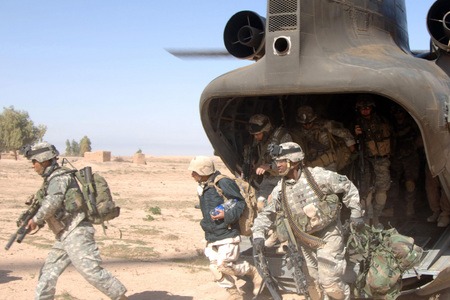
WASHINGTON (AP) — Pentagon leaders are now reviewing the military’s initial assessment of Iraq’s security forces and it may be some time before decisions are made about what additional assistance the U.S. should provide as the Baghdad government battles Sunni insurgents.
The chairman of the Joint Chiefs of Staff, Gen. Martin Dempsey, has read the completed assessment. A Pentagon spokesman said Defense Secretary Chuck Hagel has received it but hadn’t had a chance to review it yet.
Defense officials declined to detail the report, but Dempsey has said the frequent updates he has received describe an Iraqi force that is logistically challenged and would have a hard time going on the offensive against the Islamic State extremist group. And the infiltration of the Sunni insurgents into the Iraqi security forces further complicates any possible move to embed U.S. military advisers with Iraq units.
“There will be a matter of some time here as we work our way through what the assessment says,” Rear Adm. John Kirby, the Pentagon press secretary, said. “Everybody knows and shares a sense of urgency about what’s going on in Iraq but it’s more important to get this issue right than to get it quick. You can expect senior leaders here in the Pentagon to take the time they need to digest this material … before recommendations can be made to the commander in chief and to the inter-agency about how to move forward.”
There are about 210 U.S. troops in Iraq conducting the assessments and working in two joint operating centers – one in Baghdad and one in the north in Irbil.
The infiltration of militants into Iraqi security force units also makes it difficult to separate the insurgents from Sunnis who are not a threat, particularly if the U.S. considers whether to conduct airstrikes against the Islamic State, Dempsey said.
Kirby said the insider threat is “a consideration that we would obviously take steps to deal with” if the U.S. decides to take on the advisory role.
Asked about the potential for airstrikes, Hagel told reporters late last week that military and defense leaders were wrestling with a lot of questions before such a decision could be made.
“Where would you strike? When would you strike? Who would you strike? Once you start strikes, are you prepared to sustain strikes over a long period of time, or short period of time?” Hagel said.
U.S. officials worry that targeting Sunnis would only further erode relations between Shiites and Sunnis in Iraq, fueling a civil war. And they also suggest that even if the U.S. strikes an insurgent stronghold, the Iraq security forces in that region might not be capable of maintaining control of the area.